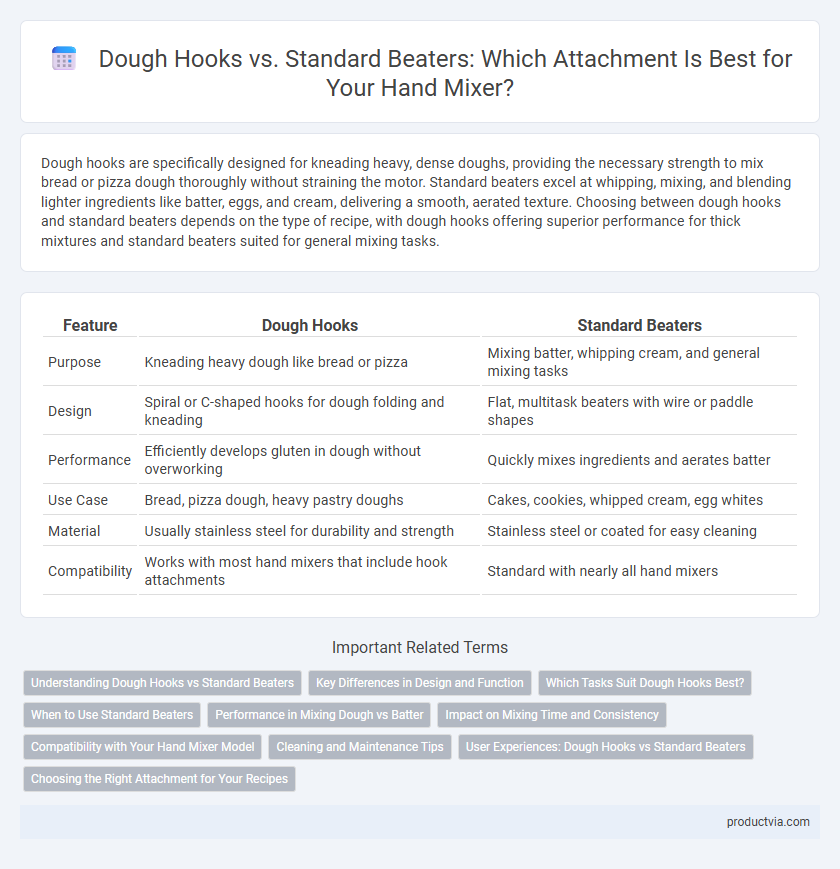Dough hooks are specifically designed for kneading heavy, dense doughs, providing the necessary strength to mix bread or pizza dough thoroughly without straining the motor. Standard beaters excel at whipping, mixing, and blending lighter ingredients like batter, eggs, and cream, delivering a smooth, aerated texture. Choosing between dough hooks and standard beaters depends on the type of recipe, with dough hooks offering superior performance for thick mixtures and standard beaters suited for general mixing tasks.
Table of Comparison
| Feature | Dough Hooks | Standard Beaters |
|---|---|---|
| Purpose | Kneading heavy dough like bread or pizza | Mixing batter, whipping cream, and general mixing tasks |
| Design | Spiral or C-shaped hooks for dough folding and kneading | Flat, multitask beaters with wire or paddle shapes |
| Performance | Efficiently develops gluten in dough without overworking | Quickly mixes ingredients and aerates batter |
| Use Case | Bread, pizza dough, heavy pastry doughs | Cakes, cookies, whipped cream, egg whites |
| Material | Usually stainless steel for durability and strength | Stainless steel or coated for easy cleaning |
| Compatibility | Works with most hand mixers that include hook attachments | Standard with nearly all hand mixers |
Understanding Dough Hooks vs Standard Beaters
Dough hooks are specifically designed for kneading heavy doughs like bread and pizza, providing the necessary torque to develop gluten without overworking the mixture. Standard beaters, however, are versatile tools ideal for mixing lighter batters, whipping cream, and combining ingredients smoothly. Choosing between dough hooks and standard beaters depends on the type of mixture and the desired texture, ensuring optimal results in baking and cooking tasks.
Key Differences in Design and Function
Dough hooks feature a spiral or C-shaped design specifically engineered to knead dense doughs by stretching and folding gluten strands, enhancing dough elasticity. Standard beaters have a flat or wire-loop structure, optimized for incorporating air into lighter mixtures like batter or whipping cream, providing faster mixing and aeration. The distinct shapes influence their function: dough hooks apply gentle, consistent pressure ideal for bread or pizza dough, while standard beaters excel at blending and whipping tasks.
Which Tasks Suit Dough Hooks Best?
Dough hooks excel at kneading heavy and dense doughs such as bread, pizza, and pasta dough, efficiently mimicking hand kneading by stretching and folding the gluten strands. They maintain the dough's structure without overworking it, ensuring optimal texture and elasticity. Standard beaters, by contrast, are better suited for lighter batters like cake or cookie mixes where aeration and blending are key.
When to Use Standard Beaters
Standard beaters for hand mixers are ideal for whipping cream, beating egg whites, and mixing cake batter, where incorporating air is essential for light and fluffy textures. They excel at blending thin to medium consistency mixtures smoothly without overworking the ingredients. For tasks requiring heavy dough kneading, dough hooks provide better efficiency, but standard beaters maintain a versatile role in most baking preparations.
Performance in Mixing Dough vs Batter
Dough hooks for hand mixers excel in kneading heavy doughs by efficiently folding and stretching gluten strands, resulting in better dough consistency with less effort. Standard beaters perform optimally when mixing lighter batters, providing smooth incorporation of ingredients for cakes and pancakes without overworking the mixture. Using the appropriate attachment enhances mixing performance, ensuring textures ideal for specific recipes.
Impact on Mixing Time and Consistency
Dough hooks are specifically designed to knead dough efficiently, reducing mixing time by evenly stretching and folding the ingredients, which leads to a more consistent texture compared to standard beaters. Standard beaters mix ingredients quickly but are less effective in developing gluten structures, often resulting in longer mixing times and uneven dough consistency. Choosing dough hooks for bread and heavy doughs ensures faster mixing with uniform results, while standard beaters suit lighter batters where speed is prioritized over texture development.
Compatibility with Your Hand Mixer Model
Dough hooks are specifically designed for kneading heavy, thick doughs and may not be compatible with all hand mixer models, as they require a strong motor and secure attachment points. Standard beaters fit most hand mixers and are ideal for mixing lighter batters or whipping cream but might struggle with dense dough mixtures. Always check the manufacturer's compatibility list to ensure the dough hooks or standard beaters are suited for your specific hand mixer model to avoid damage or poor performance.
Cleaning and Maintenance Tips
Dough hooks typically accumulate less residue than standard beaters, making them easier to clean after kneading dense doughs. Standard beaters often require thorough scrubbing to remove sticky batter from the multiple prongs and crevices. To maintain optimal hygiene and prolong the lifespan of both attachments, hand wash with warm, soapy water immediately after use and periodically inspect for damage or rust.
User Experiences: Dough Hooks vs Standard Beaters
Dough hooks excel in user experiences by efficiently kneading heavy doughs, reducing hand strain and delivering consistent texture, which is highly valued by frequent bakers. Standard beaters perform better with lighter mixtures like cake batter or whipped cream, offering faster aeration and smoother blending but may struggle with dense doughs. Users often prefer dough hooks for bread and pizza recipes due to their durability and mixing power, while standard beaters remain the go-to for everyday mixing tasks in the kitchen.
Choosing the Right Attachment for Your Recipes
Dough hooks are specifically designed for kneading heavy, elastic doughs like bread or pizza, efficiently developing gluten structure without overworking the batter. Standard beaters are versatile attachments ideal for mixing lighter batters, whipping cream, or beating eggs to achieve smooth, airy textures. Selecting the right attachment enhances mixing performance and ensures optimal texture and consistency tailored to your recipe's requirements.
Dough hooks vs Standard beaters for hand mixer Infographic

 productvia.com
productvia.com